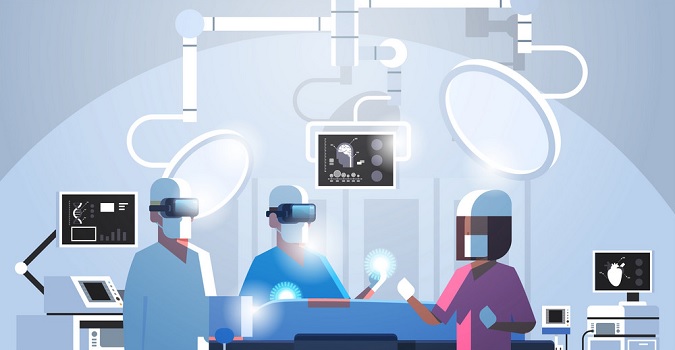In today’s modern era, medical practice is no longer limited to doctors, nurses, and patients;…

How Metaverse Reshaping The Healthcare Industry?
Metaverse in healthcare has accelerated within the last two years, with augmented solutions that allow remote interaction. The healthcare system is complicated, needing severe interaction strategies to achieve optimal outcomes. For example, students can learn in the Metaverse and participate in surgeries that show details in 3D.
Patients can easily speak with their doctors before surgery and experience a digital walk-through of the available facilities. Doctors can discuss the process with colleagues digitally. Now the question is, are these things new? No, they are not new. However, the major differences are quality and immersiveness. Technology makes virtual worlds more attainable through adequate computing capacity and virtual reality (VR) headsets. But it also delivers more associations to devices that can support the experience and actual treatment.
Metaverse and Healthcare
Metaverse involves the intersection of three primary technological trends — augmented reality (AR), artificial intelligence (AI), and virtual reality (VR). Together, they can open up comprehensive new channels for providing treatment, reducing costs, and especially improving patient outcomes in healthcare.
Metaverse in the healthcare sector can uplift medical treatments and help doctors in different aspects. In the future Metaverse in healthcare can take complete control of frontline health workers assisting them to save lives without putting themselves in trouble.
Channels that are empowering metaverse for healthcare
- Digital Twins
It is a virtual model or simulation of an object, process, or system that is developed using real-world information to learn more about its real-world doppelganger. In the metaverse, the twin could be the patient themself.

An online medical service specialized in occupational health will ultimately be used as “trial dummies” for people, predicting everything from how we will heal from surgery to how we would respond to specific medicines. This will be created further when our capability to map and comprehend individual genetics improves. Consider a virtual presentation of a person where every known medicine for that person’s illness can be tested. This will enable the right treatment to be determined. It can also monitor the virtual “person” and notify you if a medical condition causes a side effect allowing preventive actions.
- Telemedicine
During the pandemic, the use of telemedicine attained maximum traction, before COVID only 43% of healthcare providers could have remote therapy for patients but now this percentage has risen to 95%. Metaverse will supplement telemedicine visits with a virtual office, where patients and physicians can meet in a 3D hospital. It is projected to enhance the user experience for teleconsultation services greatly. Using VR, the metaverse in healthcare can facilitate next-level immersion, by delivering a vastly higher intent of “being there” than other virtual atmospheres like websites, messaging applications, or social media. With such consultations, patients will no longer be restricted to being treated by specific professionals owing to their physical location.

Metaverse in the healthcare industry can be highly effective for therapy. Patients can easily interact with circumstances that cause them anxiety in secure environments where every element of the interaction can be monitored and controlled closely.
Healthcare Data Privacy in Metaverse
Metaverse is set to function through next-gen technologies like virtual reality, augmented reality, machine learning, and AI. These behavioral-learning technologies for healthcare organizations often collect massive amounts of data based on user personal information, threatening privacy. Therefore, using such technologies within the metaverse can become a significant danger to patient data privacy.
Following are some effective ways that healthcare companies can adopt to ensure data privacy and security while interacting with their patient’s in the metaverse:
- When healthcare organizations deploy AR/VR devices or platforms they should ensure that the risks of cyberattacks, data breaches, and other threats are strictly monitored.
- Protect healthcare data from privacy invasions by using cybersecurity services, adopting VPNs, installing antivirus software, and building robust network infrastructure.
The Future Of Metaverse In Healthcare
With the intersection of core technologies in the metaverse – the healthcare industry will be able to provide more integrated treatment programs and packages, barren of the siloed core of much of the current healthcare system. These technologies-based solutions are improving patient experiences and consequences already. Even straightforward methods like intravenous injections and blood draws can benefit from them, for instance, through using Accuvein, the latest technology that shows veins into the skin.
With these major enhancements in healthcare being made to leverage the metaverse, along with a large number of growing startups developing AR and VR solutions, the medical industry will soon experience a revolutionary change in the next few years.
The capability to share information between healthcare professionals immediately would enable quicker identification of the underlying causes of disease. Monitoring patient movement in the metaverse also allows for easier tracking of variables like compliance, which will help in the diagnosis and treatment of diseases.
Enter a new era of transformation
Today, healthcare businesses are rushing to conquer a considerably different future from the one they were meant to operate.
Soon, every medical practice will face new technologies. These range from developing physical and virtual realities to offering services in metaverse environments.
To grow and survive in this rapidly changing space, healthcare IT companies must adopt responsible strategies. This includes data ownership, inclusion, diversity, sustainability, security, and personal safety. Like many technologies in medical IT, the metaverse still has a long way to go before it becomes part of daily life.
Conclusion
We know Metaverse has just started, but it is affecting several industries. No doubt, it will surely transform our lives in the upcoming decades. So, without skipping out on the technology, reach out to Medical IT. Services and have your healthcare business presence on a virtual platform to stand ahead of your competition.




